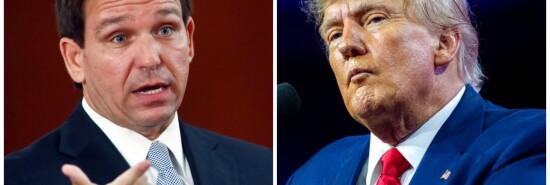
A surreal 2024 GOP race
Byron York
A SURREAL 2024 GOP RACE. Word is Gov. Ron DeSantis (R-FL) will declare his presidential candidacy next week. With that, the charade of a non-candidate candidate, a common occurrence in the early stages of a presidential race, will come to an end. DeSantis will be in the race, and what is currently referred to as his “political team” will be a real live campaign.
Here is the weird thing. DeSantis has a lot going for him as a candidate. He is newly reelected as the governor of the nation’s third-largest state. He has just come off a string of significant legislative victories. He has a record and positions that appeal to the conservative Republican primary base. He has tons of money and lots of rich supporters. He has gotten a good reception in conservative media. And yet, DeSantis is fighting against the idea that he has lost the race before entering it.
Certainly the national polls look terrible for DeSantis. In the RealClearPolitics average of national surveys, former President Donald Trump has a 36-point lead over the Florida governor. Thirty-six points! That is huge. And who knows? It might be insurmountable. Or it might fall apart, quickly or slowly, depending on events.
Subscribe today to the Washington Examiner magazine that will keep you up to date with what’s going on in Washington. SUBSCRIBE NOW: Just $1.00 an issue!
The point is, it’s far too early to declare a race over when it hasn’t even fully begun. Trump clearly wants to run as an incumbent president, and a lot of his supporters see him that way. They would be happy to see canceled primaries and a nomination by acclamation. But Trump is not the incumbent president, and whether he likes it or not, an actual primary campaign is forming at this very moment.
By the end of next week, the field will likely include Trump, DeSantis, Nikki Haley, Tim Scott, Chris Christie, Asa Hutchinson, and Vivek Ramaswamy. Later, it could possibly include Mike Pence and others, perhaps Glenn Youngkin and Chris Sununu.
The first thing to say about the field is that the stature gap is enormous. Back in 2016, Trump seemed larger than his opponents in the Republican field — a field that included Jeb Bush, Ted Cruz, Marco Rubio, Mike Huckabee, and many others. Now, Trump is a former president of the United States and looms even larger over a field that, with some exceptions, is a bit lower-powered than in 2016. The short version is: Trump is big, and they are small. Voters see that, and it affects their thinking.
But there is an equally enormous difference between 2016 and 2024. Trump has been president. He has a record. People know what it was like for him to be president, and they will have to decide whether they want that again.
It’s a great unknown. Yes, a lot of Republican voters were very, very happy under a Trump presidency, and they will vote without hesitation for another term. But a lot of others grew tired of Trump’s presence in office, even as they generally approved of the results. Plus, they worry that a second term would mean Trump would serve until he is 82 years old, with all the uncertainties that involves. Finally, there is the unknown factor of the investigations targeting Trump, which could hurt him or help him in a Republican race, depending on the substance of any allegations made.
All of those factors create uncertainty. And the other important thing to remember when considering national polls is that the Republican primary race is not a national race. It begins with caucuses in Iowa and then moves to primaries in New Hampshire and South Carolina. By that time, the race is usually nearly settled, although the campaigning goes on. National polls do not necessarily reflect — actually cannot reflect — what Republican voter sentiment in Iowa, New Hampshire, and South Carolina will be in early 2024.
DeSantis just had a successful visit to Iowa, where he picked up a lot, about three dozen, endorsements from state legislators. He’ll certainly be going to Iowa a lot more after he declares, and support there, where Trump came in second in the 2016 caucuses, could grow. DeSantis has also lined up a significant amount of support in New Hampshire.
There seems little doubt that Trump is still leading in those states, but DeSantis’s support appears to be growing even before he has joined the race. We’ll see what happens now.
The bottom line is there is a staggering amount of uncertainty in the Republican race. (Yes, there is just as much in the Democratic race, with an incumbent president, no less, although that is a subject for other newsletters.) Even though Trump has a 36-point national lead at the moment, it cannot predict the course of the race to come. Yes, in the end, Trump might end up winning handily. But there’s a lot to go through between now and then.
For a deeper dive into many of the topics covered in the Daily Memo, please listen to my podcast, The Byron York Show — available on the Ricochet Audio Network and everywhere else podcasts can be found. You can use this link to subscribe.
